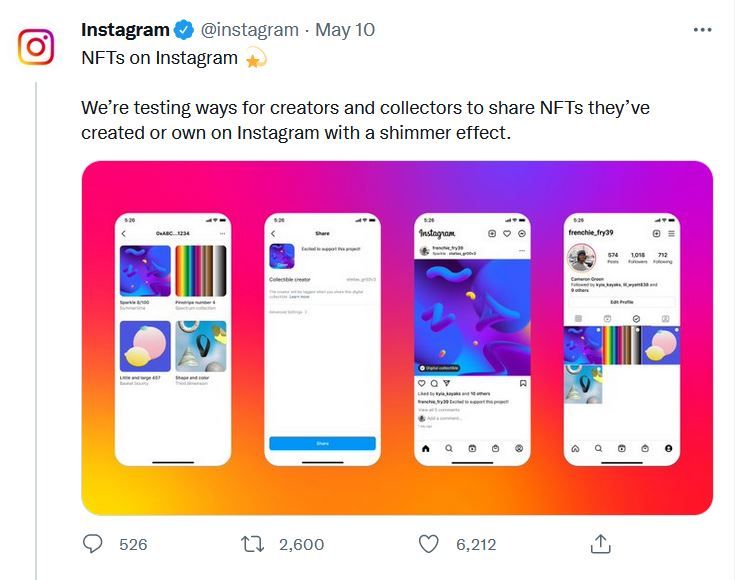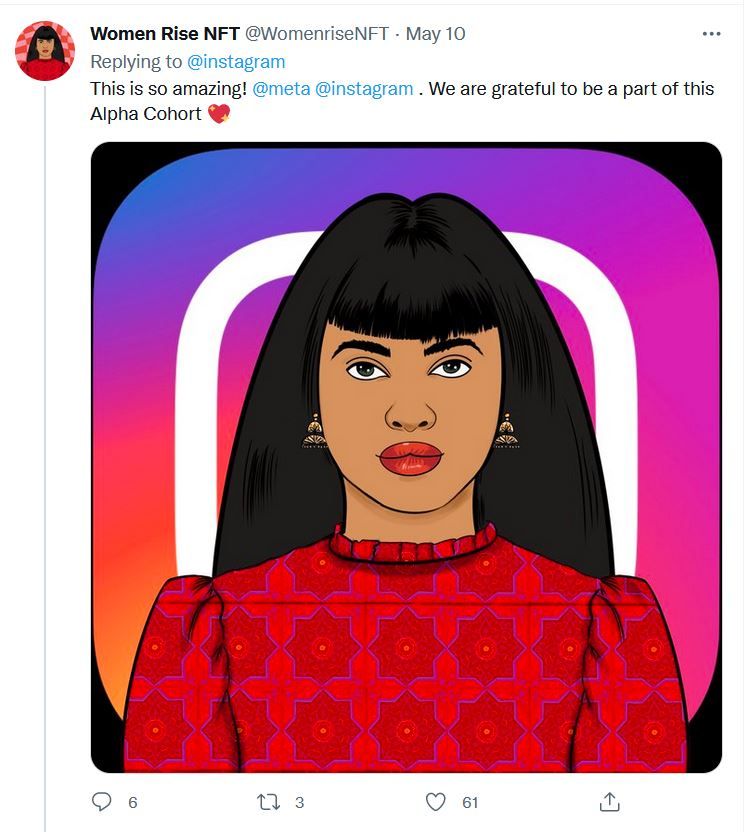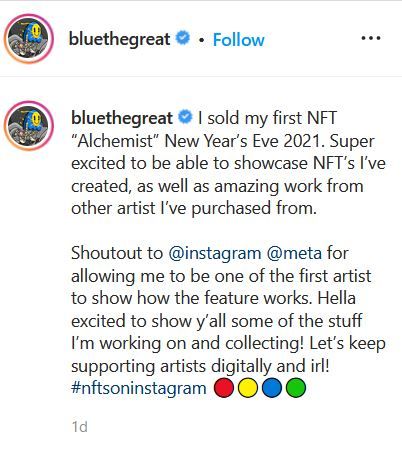While crypto has reached its lowest value since 2020, Meta chose either the best or the worst time to unveil its first real venture into NFTs. On Tuesday, Instagram announced on Twitter that it’s testing out a way for creators and collectors to share NFTs on Instagram.

This goes beyond simple image-sharing. According to its announcement, Instagram will be able to connect to a digital wallet, allow users to choose which NFT images to share, and automatically tag both creator and collector. Wallet connectivity is currently possible for Ethereum and Polygon, with Flow and Solana compatibility coming soon.
This feature will initially be tested among a small number of NFT holders in the US. Among the testers name-dropped by Instagram are Adam Bomb Squad, the creators of Women Rise and Boss Beauties, and our favorite grifter, Gary Vee.
It’s kind of ironic that, just a couple weeks after an Instagram hack disturbed the BAYC community, Instagram is announcing its own venture into NFTs. A couple weeks is a long time on the internet, so perhaps people have forgotten about it. But I sure haven’t – I wrote that article, after all.
Mixed Reviews
Reactions from the crypto community have been mixed. Some found the news bullish, even suggesting that now is the time to buy into Polygon. Others asked about participating in beta testing. More than a few plugged for Cardano integration – is it just me, or do you see people plugging for Cardano in every announcement thread?
Other responses were negative, saying things like “please don’t do this,” and outside the NFT community, some haters piled on claiming it as an excuse to unfollow or get off Instagram entirely (they won’t be missed). A few got a bit creative with their replies; one shared an image from the NFT collection Tales from the Yacht Club, depicting a Bored Ape smacking Mark Zuckerberg, to express their distaste.

How will this affect NFTs and Web3 in the long run?
In a way, Instagram NFT integration could be a good thing. Bringing visibility to NFT projects that are not BAYC to a larger audience outside the crypto space could lead to greater interest and more widespread adoption of NFTs. On the other hand, crypto saw a surge of interest last year, which led not only to a swarm of scams and rugpulls but also to a bubble that we are now seeing deflate before our eyes.
Sure, it’s nice that creators like bluethegreat and Maliha_z_art, the founder of Women Rise NFT, are getting recognized for their success and influence in the NFT space. And considering that this was a volunteer thing, the creators who agreed to participate clearly think that this is a good move. Wider recognition of their work and broader adoption of NFTs may be their goals. But let’s not forget that Instagram is owned by Meta.

Meta, the company known for its blatant disregard for privacy, negligence of content moderation, and disinformation mismanagement that is borderline criminal. The company that also wants to take half of creators’ income in its metaverse venture Horizon Worlds.
And considering that Instagram is rife with scammers, the app might not be the best place to improve NFTs’ reputation among the ill-informed. Not to mention that wallet integration may make NFT collectors even more vulnerable to hacks and scams.
Instagram is likely testing the waters for entering into the cryptosphere, maybe with an eventual goal of launching its own marketplace or even a new currency. These creators (and Gary) may be used to attract new users to Meta’s potential NFT market, taking it away from Web3-native entities. Sure, OpenSea deserves to have a bit of wind taken out of its sails, but it shouldn’t be directed to Meta instead.

The problem with Meta, along with many other bloated Web2 corporations, is that it’s so entrenched in the public’s awareness it can easily direct attention toward itself and away from smaller upstarts. Web3 entities sprang up to create an alternative to Web2 hegemonic companies, not as an extension of them.
Meta is the antithesis of what Web3 stands for. While Web3 strives for transparency, decentralization, and greater autonomy, Meta obscures, centralizes, and imposes greater controls. Allowing Meta to usher in greater adoption of NFTs will give them yet another foothold in which to secure its supremacy as a tech company. Large tech companies already hold an advantage over any and all upstarts just on brand recognition alone.
Of course, we can’t bar corporations from getting into Ethereum — that also would go against Web3 principles of inclusivity. But we can make damn sure that it’s hard for them to get a proper foothold by not buying in to this bullshit.


